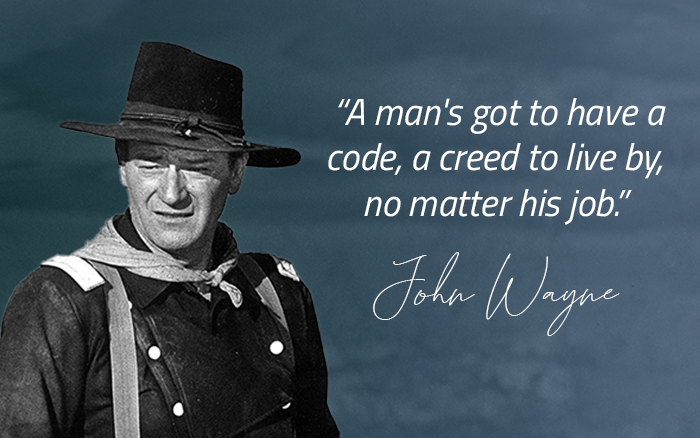There has always been a man code. It represents what most of society values in masculinity – attributes that men are socialized to believe they should strive for in order to be respected and welcomed into the tribe of men.
Stoicism Is One of Those Attributes
It may be surprising to learn that stoicism is actually an ancient philosophy that was a way of thinking and behaving to be emulated, as espoused and practiced by ancient leaders and philosophers Marcus Aurelius, Epictetus, and Seneca. This philosophy has been studied by the likes of George Washington and Ralph Waldo Emerson. In fact, Tim Ferris referred to this ancient way of living as the ideal “personal operating system.”
What Was This Ancient Version of Stoicism?
The essential elements of stoicism revolve around virtues of self-control, courage, wisdom, and justice, especially that it’s our perception and response to the world and its events that matter more than the events themselves. It is akin to what we talk about as being one of the goals of mindfulness – to be thoughtfully and consciously responsive to triggers, rather than reactive, acting on auto-pilot.
But somehow, this proud history of stoicism and its ideals has been transformed such that being stoic, while still seen as aspirational for men, is taken to mean emotionless, adjacent to being strong, but in a perverse and lone wolf sort of way.
The concept of being resilient and staying true to oneself, in charge of one’s own reaction to what life throws at you, has transformed into the term “stoic” means being unaffected by pain and unwilling to show emotion.
In fact, the first definition of stoic in the dictionary is now:
“A person who can endure pain or hardship without showing their feelings or complaining.”
In truth, we know that the inability or unwillingness to show emotion is actually not enviable, admirable, or even healthy. For example, studies have shown that this current notion of stoicism leads to under-reporting of symptoms, especially pain, and delayed receipt of needed care.
This is just one example of how many of the traditional ideals of masculinity have been bastardized to become a part of toxic masculinity. Being a successful and respectable man shouldn’t mean hiding emotions and pretending not to need help. It should mean knowing oneself and being authentic, not hiding one’s weaknesses.
Having this approach affects not only men who end up not getting the care they need, but also impacts those around them by being guys that are not truly connecting on an emotional level or acting out because of pent-up feelings or inappropriate expressions of anxiety or anger.
How Can You Actually Incorporate the More Authentic and Ancient Values of Stoicism?
After all, stoicism is all about living the best life possible. It’s about tuning in to what is happening around you, mastering your response, and acting in line with your greatest self, your truest and most honorable character.
Some primary ways to practice stoicism:
- Know what your goal is for every situation. Go into situations with a clear purpose, because without an end in mind, you don’t have a goal to reach.
- Identify and separate out what you can control from what you can’t.
- Act in accordance with your priorities. Actions turn into habits, and habits become your character.
We can learn a lot about the true attributes of manliness in studying these ancient philosophers and in questioning the man code as it currently stands.
Stoicism is all about realizing you can’t control every situation, but you can control how you respond to every situation. That is a far cry from repressing your emotional responses or thinking a “real man” can’t share vulnerabilities.
Are you getting the nutrients you need for long-term health? Download my Top 10 Supplements For Men PDF to learn about the most critical supplements you need.
Myles Spar, MD, MPH is board certified in Internal Medicine and in Integrative Medicine. As a clinician, teacher and researcher on faculty of two major medical centers, he has led the charge for a more proactive, holistic and personalized approach to care that focuses on cutting edge technology and preventative care. Dr. Spar has been a consultant with the NBA, presented a TEDx Talk, appeared on national television, and been featured in publications such as the Men’s Journal and the Los Angeles Times. He was most recently National Medical Director and Chief Medical Officer of a national medical practice, but is available to consult with individual patients interested in a personalized approach to optimal performance and health.



